European Institute of Women’s Health
POSITION PAPER LAUNCH
“Women and Dementia in Europe: Addressing the disproportionate burden of dementia on women”
EUROPEAN PARLIAMENT LAUNCH
22nd of January 2019 in Brussels, Belgium
The European Institute of Women’s Health (EIWH) launched its
Position Paper ‘Women and Dementia in Europe: Addressing the
disproportionate burden of dementia on women’ on 22 January
2019, in the European Parliament.
This event was hosted by Sirpa Pietikäinen, MEP.
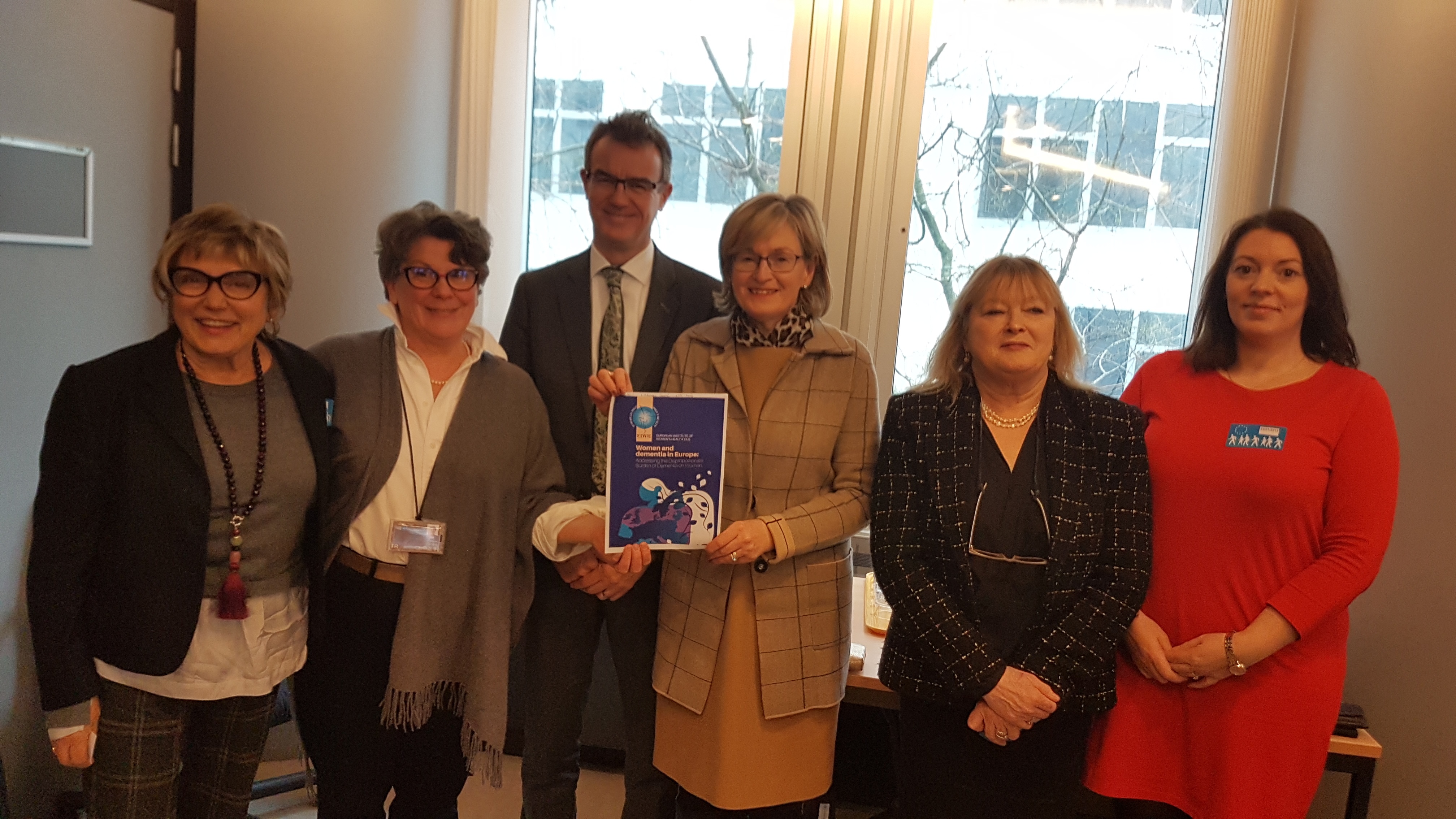
Event Overview
On 22 January 2019, the European Institute of Women’s Health (EIWH) officially launched its Position Paper “Women and Dementia in Europe : Addressing the disproportionate burden of dementia on women“ in the European Parliament, in Brussels.
The event was hosted by Sirpa Pietikäinen, Finnish Member of the European Parliament (MEP) and long-standing advocate of women’s health issues and dementia at European and national level. Speakers included representatives from the EIWH, European Commission, European Brain Council, Eurocarers, Age Platform EU, national Alzheimer’s associations and Fundació ACE. This event took place in the wake of the EIWH’s campaign Healthy Women—Healthy Europe, which profiles that Europe can do more to prioritize women’s health.
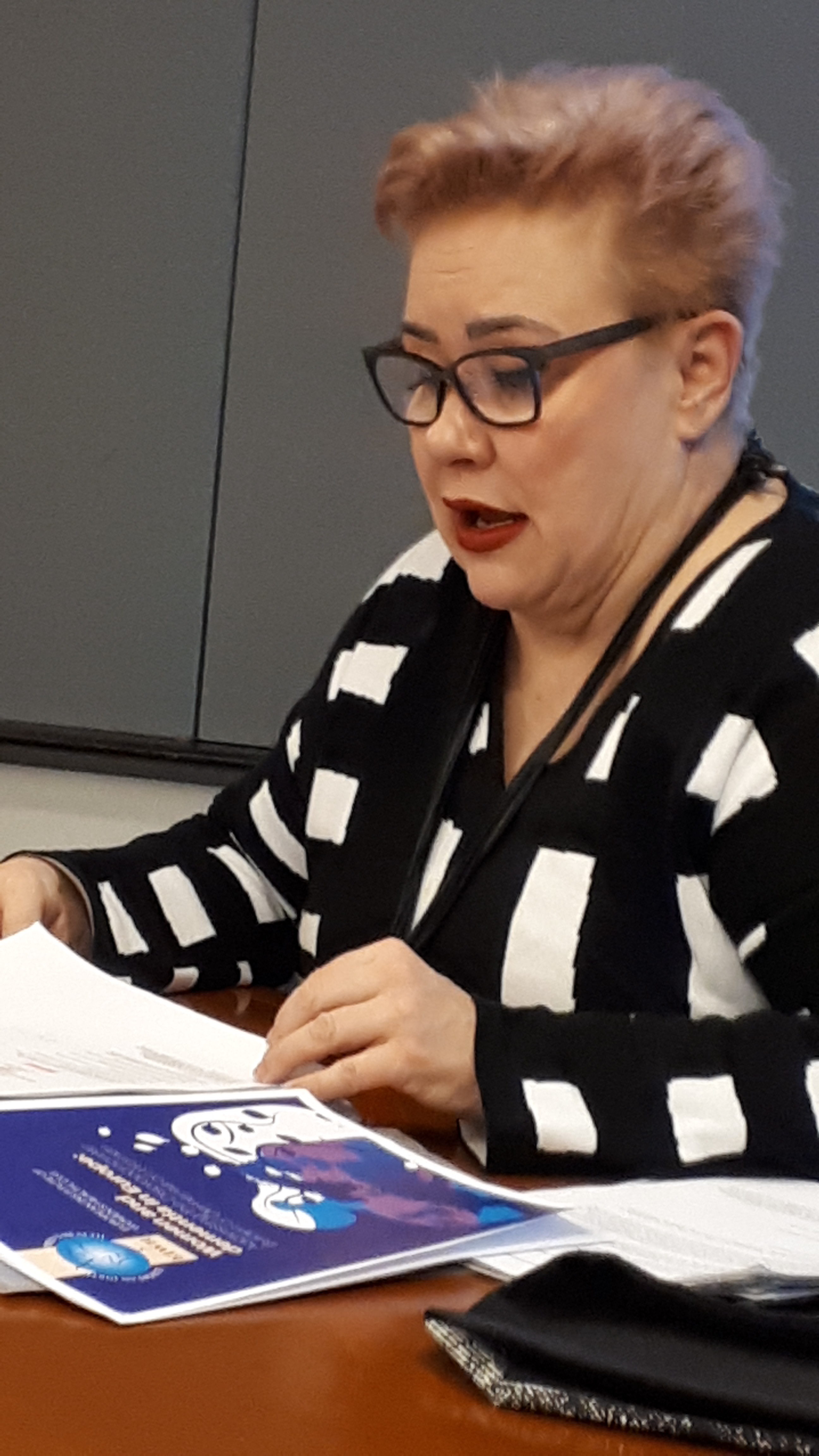 Sirpa Pietikäinen, MEP.
Sirpa Pietikäinen, MEP.
Welcome and Introduction
In her introductory speech, Sirpa Pietikäinen, MEP praised the paper as it correctly sets the scene : Alzheimer’s disease (AD), the most common form of dementia, is a women’s issue. Women are affected as patients, carers and professionals. This is a gender, social and economic issue.
Ms Pietikäinen welcomed the Paper findings and recommendations and urged the EIWH and Women and Alzheimer Advisory Council to go forward. The European Union must dedicate more resources and studies on the gender aspect of dementia. We need figures to know the obstacles and remove them. The Member States must act too and duly recognise the gender aspect of AD. They need to invest money in care to save on other sides (like hospital costs).
One must pay specific attention to the gender aspects of care services and formal care. The working conditions and security of formal care services must also be looked at, as well as the training of these carers. Unregistered care work needs to be addressed.
While digitalisation can support care provision, it is essential to remember that it has to be adapted to the needs otherwise those who would actually benefit would be excluded. Digital tools must be designed for all, seriously. Ms Pietikäinen also urged that further investment should be made in prevention and early diagnosis, in order to alleviate the disease burden as well as the significant costs involved in dementia care. Finally, Ms. Pietikainen emphasised that attitudes towards dementia need to change : we must recognise and act upon the feminisation of the dementia issue.
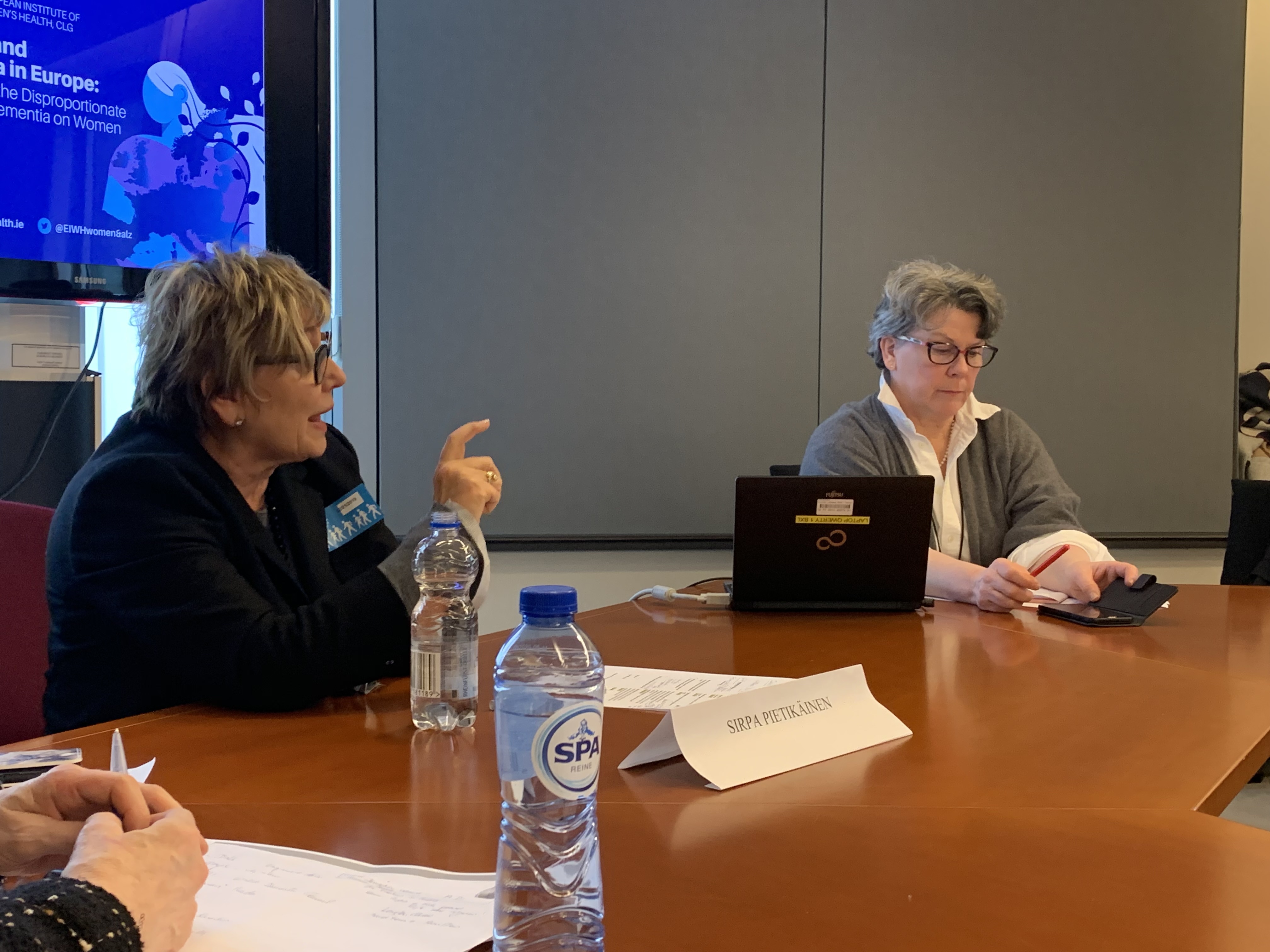
From left: Merce Boada and Annette Dumas
EIWH Women and Dementia Position Paper findings
Peggy Maguire, European Institute of Women’s Health, presented the main findings of the Position Paper. She explained that women are disproportionately and increasingly affected by dementia, both as patients and carers. Indeed research suggests that prevalence rates may be much higher among women notably due to widespread under-diagnosis and longer life expectancy.
Multiple biological and social factors come into play to explain this gender imbalance, including women-specific risk factors, such as pregnancy, menopause-induced changes, or their social role as primary family caregiver. Women experience manifestation and progression of the disease differently but more evidence is required to support these claims, as clinical data is rarely stratified by sex.
Ms. Maguire reminded the audience that no treatment exists to cure dementia. Consequently, there is a need to focus on preventive strategies that target lifestyle behaviours and socio-economic factors, and work towards improving timely diagnosis by breaking down stigma and enhancing GP knowledge. Interventions to modify disease progression must increase. Gender-based approaches that improve the lives of people living with dementia and their carers must be developed.
Gender in EU Research
Stéphane Hogan, DG Research & Innovation, European Commission, presented the Commission’s support to brain research. He presented a number of collaborative research & innovation projects in relation to dementia (In Mindd, Prodemos, Lipididiet, ADDIA).
M. Hogan highlighted the importance of public-public partnerships and global co-operation in research and provided various examples of dementia-related organisations at each level.
He presented Horizon 2020 efforts in dementia research to better understand the causative mechanisms of AD, develop new diagnostic and treatment options and improve management and care of AD patients. 91 projects of the Horizon 2020 plan focused on dementia and €195 million were invested to fund them.
The Horizon 2020 approach on gender equality explicitly requires sex/gender differences to be taken into account when submitting applications for EU funding in health research. Gender aspects are a selection criteria.
The next EU research programme 2021-2027 (Horizon Europe) will further support breakthrough innovation by setting up a European Innovation Council and create more impact through R&I mission-orientation and citizens’ involvement. It will also attempt to strengthen international cooperation by extending association possibilities, reinforce openness by implementing open science policy and rationalise the funding landscape through new approach to partnerships.
Gender in EU Research
Stéphane Hogan, DG Research & Innovation, European Commission, presented the Commission’s support to brain research. He presented a number of collaborative research & innovation projects in relation to dementia (In Mindd, Prodemos, Lipididiet, ADDIA).
M. Hogan highlighted the importance of public-public partnerships and global co-operation in research and provided various examples of dementia-related organisations at each level.
He presented Horizon 2020 efforts in dementia research to better understand the causative mechanisms of AD, develop new diagnostic and treatment options and improve management and care of AD patients. 91 projects of the Horizon 2020 plan focused on dementia and €195 million were invested to fund them.
The Horizon 2020 approach on gender equality explicitly requires sex/gender differences to be taken into account when submitting applications for EU funding in health research. Gender aspects are a selection criteria.
The next EU research programme 2021-2027 (Horizon Europe) will further support breakthrough innovation by setting up a European Innovation Council and create more impact through R&I mission-orientation and citizens’ involvement. It will also attempt to strengthen international cooperation by extending association possibilities, reinforce openness by implementing open science policy and rationalise the funding landscape through new approach to partnerships.
Carers’ Perspective: Eurocarers
Stecy Yghemonos, Eurocarers, stressed that approximately 80% of dementia care is provided informally, by spouses, relatives or friends. Two thirds of these informal carers are women because of systemic issues and societal pressures. There are between 60 and 75 million informal female carers in Europe.
M. Yghemonos emphasised the growing demand for this form of care, due to various demographic and socio-economic developments. In spite of their obvious importance, interests and perspectives of carers are too often neglected in policies that impact them.
To further raise awareness about the significant contribution made by carers and the need for EU and national policy to support carers, Eurocarers is proposing a EU level strategy in support of informal care provision. The organisation is also calling for a ‘European Year for Carers’.
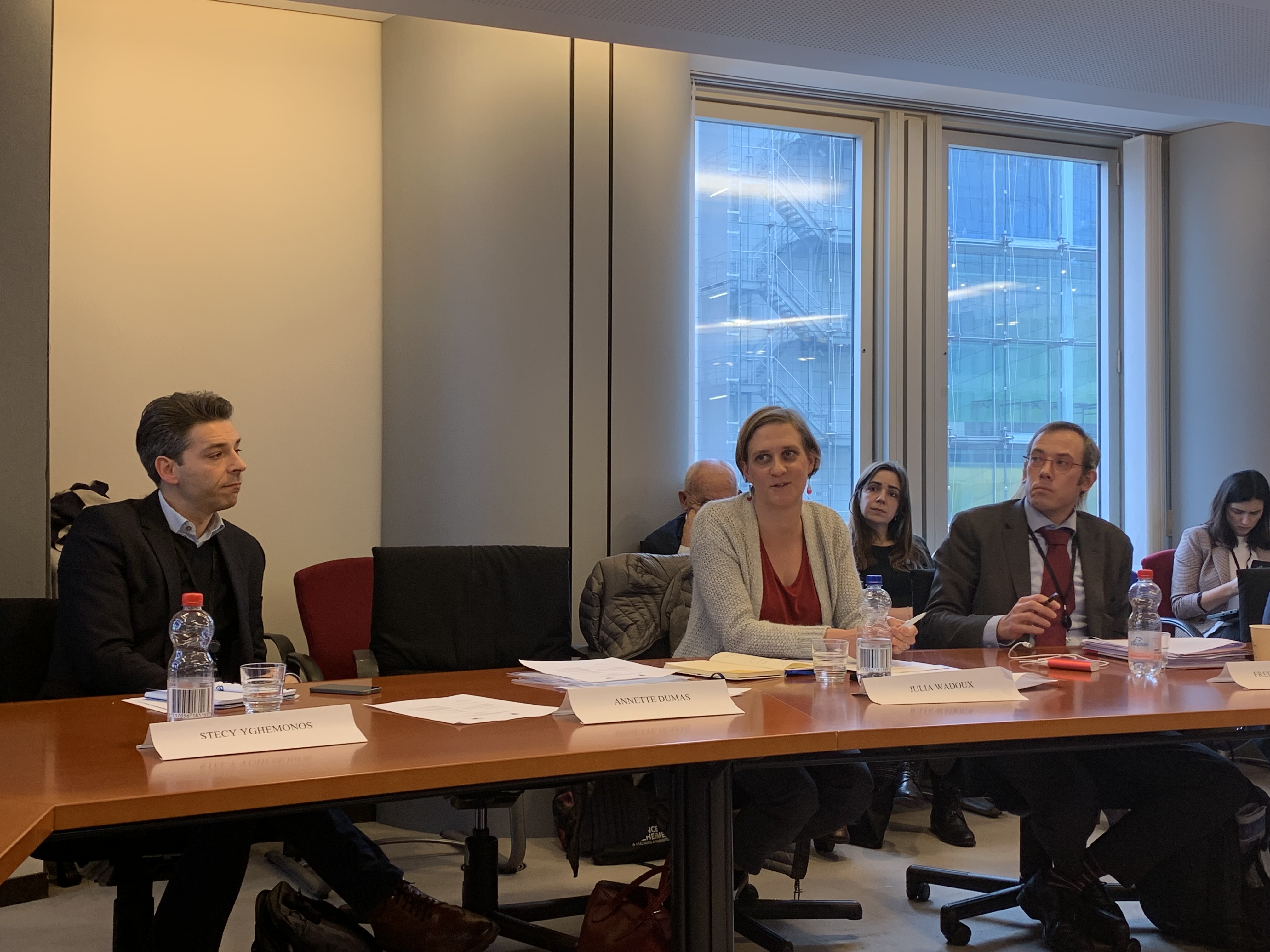 From left: Frédéric Destrebecq, Julia Wadoux & Stecy Yghemonos
From left: Frédéric Destrebecq, Julia Wadoux & Stecy Yghemonos
Dementia and Ageing: Age Platform EU
Julia Wadoux, AGE Platform EU presented the organisation’s latest human rights campaign against ageism. Women face the double burden of being older and often disabled. The human rights frame spans women, the conception of dementia and older persons. One must break the stigma and discrimination surrounding dementia. It is important to promote the understanding of dementia and shift attitudes towards dementia patients. Policy makers have a key role to play in this respect.
AGE Platform has identified some sources for improvement : rehabilitation, access to long-term care and aid services to alleviate the dementia burden. Prevention should be prioritised to the same extent as short- and mid- term solutions.
Ms Wadoux ended on a positive note with the example of Dementia Friendly Environments that strive to set up inclusive environments in the community for people with dementia and their carers.
Importance of Gender and Brain Health: European Brain Council (EBC)
Frédéric Destrebecq, European Brain Council,mentioned the organisation’s ‘Value of Treatment for Brain Disorders’ project. This project assessed the treatment gap and the cost of non- or inadequate treatment for brain disorders. The study included AD. The project findings recommend early intervention and the promotion of a holistic healthcare approach.
In the research area, there remains a need to join forces to fight fragmentation by aligning our agenda and operations. Data reproducibility is also an issue to tackle.
Mr Destrebecq also mentioned the organisation’s new project: The European Brain Research Area (EBRA). This is a platform for brain research stakeholders (researchers, clinicians, patients, governments, funders and public institutions) to streamline and better co-ordinate brain research across Europe while fostering global initiatives. EBRA is a response to the diversified nature of European public research, and the complexity of the brain that imposes a joint and coordinated research effort to improve our understanding of the brain and its disorders.
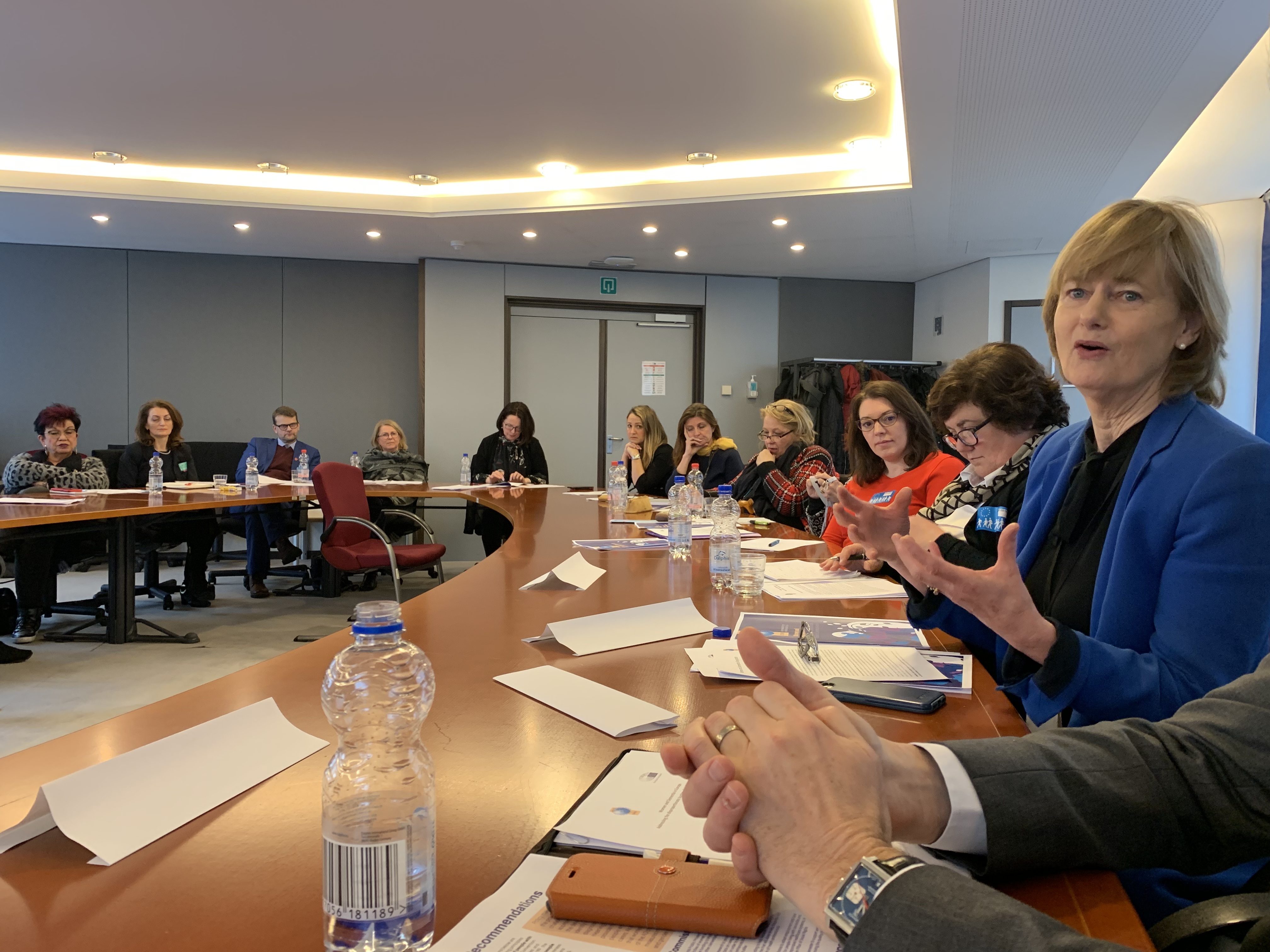
Deirdre Clune, MEP
Patient and carer support: Alzheimer Portugal
Rosario Zincke dos Reis, Alzheimer Portugal and Alzheimer Europe, deplored that in spite of gender equality being promoted by the national Constitution, Portugal remains without legal framework for unpaid carers. Training, respite, social and financial support are still dearly lacking. Although a promising National Strategy on Equality and Non Discrimination – Portugal + Igual was launched last year, no actions have been taken yet.
Ms Zincke dos Reis urged that women confronted with dementia as patient or carer should benefit from greater awareness, as they are faced with greater health and social challenges. According to Portuguese studies, women are more likely to be carers, for a longer time period and endure a stronger physical and emotional burden. In addition, most of female informal carers are between 45 and 75 years of age and have a very low educational level; only half is still employed, which demonstrates the difficulty involved with conciliating work and care provision.
Deidre Clune, Mairead McGuinness and Marisa Matias (MEPs) attended the event. They all praised the EIWH for the quality of the Position Paper and expressed their full support to the policy recommendations. As representative of civil society, they stressed that the European Parliament has a key role to play to embrace the challenges of women dealing with dementia, as patients, carers and professionals, and help make progress.
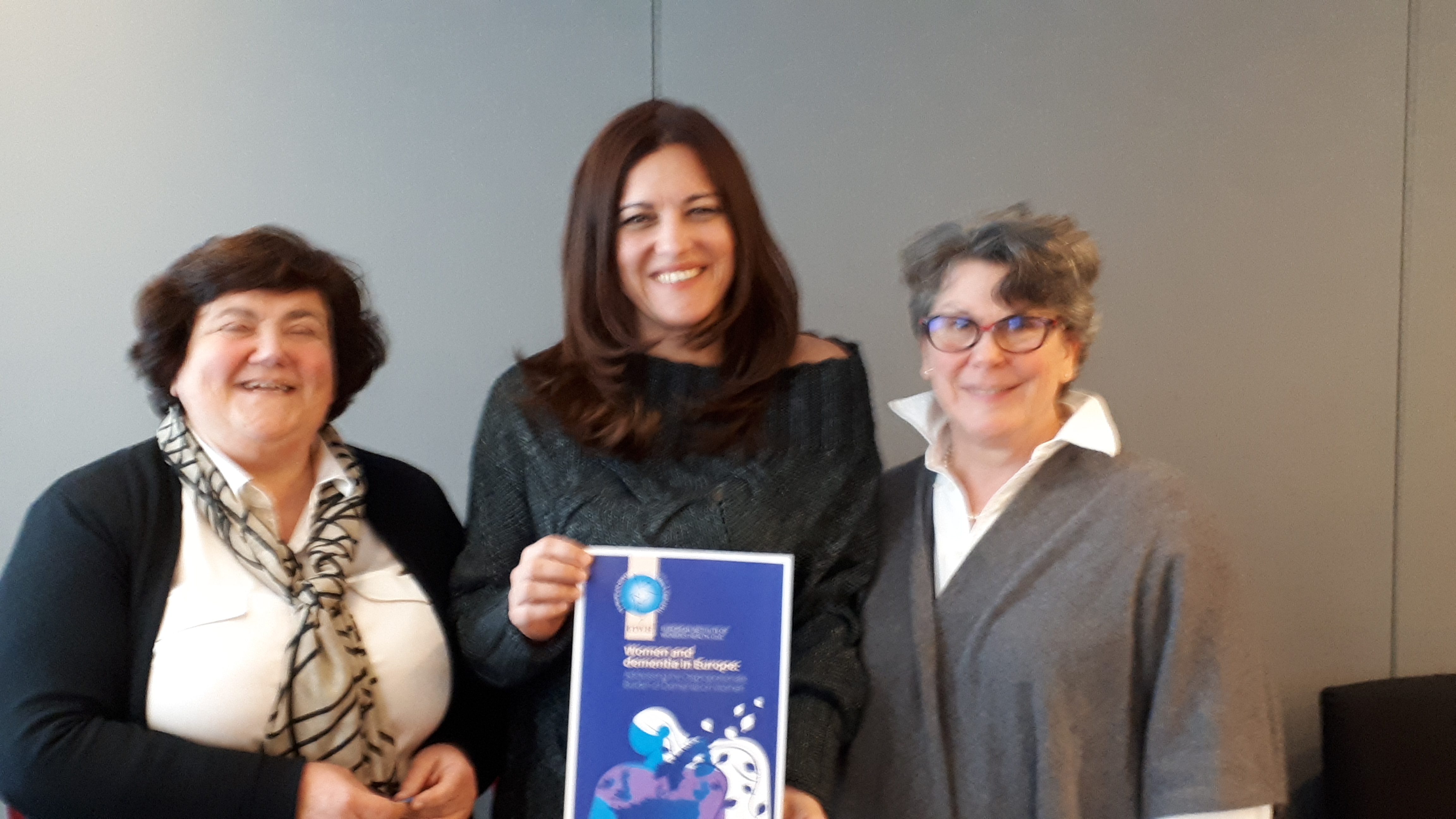
From left: Annette Dumas, Marisa Matias and Rosario Zincke dos Reis
European Commission recommendations
-
Develop a European dementia strategy that includes a clear sex and gender approach
-
Facilitate exchange of best practices- improve the state of women’s health and socioeconomic status in the EU
-
Intensify research aimed at understanding how sex and gender factors may influence dementia
-
Increase European funding to offset any EU preclinical and clinical research-provide gender disaggregated necessary data on caregiving
-
Support Member States to adapt employment and care support structures for people living with dementia and their carers within responsive healthcare systems, in line with the European Pillar of Social Rights
European Parliament recommendations
-
Raise awareness at National and EU level about women’s brain health and the specific public health and social challenges faced by women confronted with dementia as both patients and caregivers
-
Spearhead EU and national level health, social, educational, legal and research policies that will address these challenges
-
Call for a European dementia strategy taking into account the specific challenges of women and dementia
-
Participate in the Global Action against Dementia
Member States recommendations
-
Strengthen their health and social systems to improve the situation of people with dementia and their caregivers
-
Embed women and AD in the development of comprehensive national dementia strategies that acknowledge and address the role of sex and gender
-
Support nation-wide awareness campaigns about the challenges of women and AD and reduce stigma
-
Devise employment strategies that will respond to the specific needs and adaptations necessary to maintain active participation in society of people with AD and their carers
International Community recommendations
-
Prioritise women and dementia within the UN Sustainable Development Goals
-
Reinforce international collaboration and private/public sector partnerships to advance knowledge across the spectrum from prevention to more effective treatments
-
Promote dementia gender mainstreaming as a priority in international bodies such as G20, the Organisation for Economic Co-operation and Development (OECD), the World Health Organisation (WHO) and the United Nations
We would like to thank our sponsors for this launch: BIOGEN, JANSSON and LILLY.
